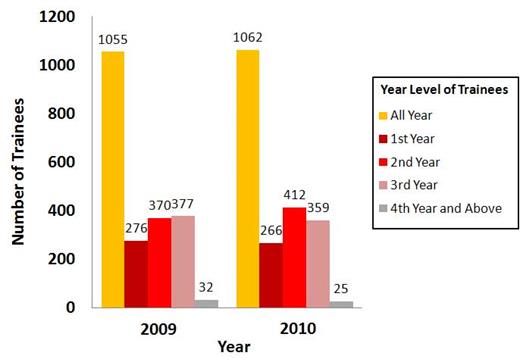Department of Translational Hematology and Oncology Research, Cleveland Clinic Taussig Cancer InstituteChair, ASH Trainee Council
This is the second year of the hematology in-service examination. Clinical hematology fellows at various levels of training from all over the country and several participants from Canadian programs took the six hour and 15-minute examination in April 2010 (Figure). An endeavor of the American Society of Hematology (ASH), the examination provides an objective assessment instrument for the medical knowledge competency of the Accreditation Council for Graduate Medical Education (ACGME)/ Residency Review Committee (RRC).
Chair of ASH’s Committee on Training Programs Dr. Scott Gitlin explained that the exam was designed to help both program directors and trainees in a variety of ways. For program directors, the examination provides an objective assessment of the level of medical knowledge in hematology of their individual trainees and serves as a benchmark and tool to improve training by identifying areas of strengths and weaknesses in their programs. For fellows, it allows for the evaluation of progress both within their training program and in comparison to national outcomes.
Clinical Hematology Fellows at Various Levels of Training From all Over the Country and Several Participants From Canadian Programs Took the Six-Hour and 15-Minute Examination in April 2010.
Clinical Hematology Fellows at Various Levels of Training From all Over the Country and Several Participants From Canadian Programs Took the Six-Hour and 15-Minute Examination in April 2010.
I had the opportunity to speak with a couple of trainees and program directors regarding the exam. Dr. Ryan Mattison, an assistant professor in the School of Medicine and Public Health at the University of Wisconsin, who took his examination in 2009, said, "It was a fair exam. It was well balanced in what you are supposed to learn in hematology. When I received my feedback, I was able to recognize areas in hematology in which I was deficient, which allowed me to focus my reading on the American Board of Internal Medicine certification exam." Dr. Julie Nangia, a third-year hematology and oncology fellow at Rush University Medical Center, took the exam in both 2009 and 2010. She was equally satisfied with each setting, and said, "I think that the exams were fair with a good representation of leukemia/lymphoma and benign hematology topics. I received my feedback in a timely fashion and was able to meet with my program director to discuss the results." She expressed that it would be useful if the feedback process could be patterned similar to the internal medicine residency in-service exams, in which specific answers are not given out but the specific learning points are mentioned. Such a change is being implemented for the 2010 exam; the exam scores will be accompanied by learning objective statements for the questions that were incorrectly answered.
From the perspective of a program director, Dr. Robert Dean, of the Cleveland Clinic Foundation, is very pleased that such an exam is available. "I believe that it allows the program director to design the fellowship curriculum according to areas of strength and weakness of the fellows. It also gives some guidance on which additional rotations may be most helpful." With regard to having all fellows take the exam, he felt that it would probably be most useful for second- and third-year fellows, since their baseline knowledge is more developed. However, Dr. Jamile Shammo, from Rush University Medical Center in Chicago, said that the exam can be useful for all years of fellowship training and that it can help fill important knowledge gaps for trainees. She pointed out that "it will also allow for improving documentation of ACGME competency."
I personally experienced the ASH in-service exam on April 6, 2010. I felt that it was a useful examination for providing personal feedback to fellows and their program directors. The examination was well balanced in topics covered and provided sufficient time for completion. And, as with any exam, rigorous attention to detail and quality control will help keep the exam up to date and useful.
The in-service examination dates for 2011 are April 5 and 6. Mark your calendar!

